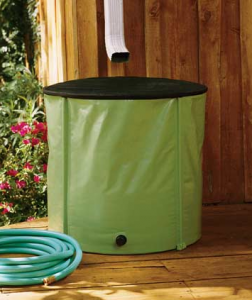- 1 read

What does stormwater runoff have to do with home composting and rain barrels? We’ll get to that in a minute, but first we have some more basic topics to discuss.
Most of us know that stormwater runoff is a major problem in our community. There are a multitude of reasons why and I’ll touch on some of them here. Most people recognize too much runoff as a problem. It erodes our soils, floods our properties and roads, and damages our homes and other infrastructure. Runoff also damages our natural ecosystems by destroying the habitats of the bugs and beasties that inhabit our streams. Too much water, too much pollution, and too much warm water leaves our properties and flows untreated into our streams each time it rains. Those poor little cold water loving bugs just can’t take it.
But there are things that we can all do to reduce the impact that stormwater runoff causes. We can all keep a little bit of that stormwater on our own properties. We can do that by using a rain barrel and by improving the water holding capacity of our lawns and gardens. By installing a rain barrel or two at your roof downspouts, you can keep many gallons of water from leaving your property and put it to better use for plant watering, car washing, or any other clean water use. Every gallon of water you keep from your roof is one less gallon of water running into the stream. You also don’t get a monthly bill for water collected from your roof. This can reduce your water and sewer bills.
You can also become a home composter. By composting using your own yard and food scraps and putting the composted material back onto your lawn or into your garden, you will be increasing the water hold capacity of the soil. Soil acts like a sponge to hold rainfall and the bigger the sponge, the more water it can hold. When you compost at home, you also decrease the amount of waste you put out for weekly trash collection and we all know that can save money for both you and the Township.
Eric Lowry is a friend, a trainee at the Eco Academy, an engineer, and Chairman of the Lower Merion (Pennsylvania) Township Environmental Advisory Council.
The Council is offering two educational programs in March 2010. On March 20, they will offer their second home composting education program. On March 27, they will offer a rain barrel education program. More information about the programs is available by emailing ericlowry (at) lowryeco (dot) com or by visiting www.lowryecosolutions.com.
Most of us know that stormwater runoff is a major problem in our community. There are a multitude of reasons why and I’ll touch on some of them here. Most people recognize too much runoff as a problem. It erodes our soils, floods our properties and roads, and damages our homes and other infrastructure. Runoff also damages our natural ecosystems by destroying the habitats of the bugs and beasties that inhabit our streams. Too much water, too much pollution, and too much warm water leaves our properties and flows untreated into our streams each time it rains. Those poor little cold water loving bugs just can’t take it.
But there are things that we can all do to reduce the impact that stormwater runoff causes. We can all keep a little bit of that stormwater on our own properties. We can do that by using a rain barrel and by improving the water holding capacity of our lawns and gardens. By installing a rain barrel or two at your roof downspouts, you can keep many gallons of water from leaving your property and put it to better use for plant watering, car washing, or any other clean water use. Every gallon of water you keep from your roof is one less gallon of water running into the stream. You also don’t get a monthly bill for water collected from your roof. This can reduce your water and sewer bills.
You can also become a home composter. By composting using your own yard and food scraps and putting the composted material back onto your lawn or into your garden, you will be increasing the water hold capacity of the soil. Soil acts like a sponge to hold rainfall and the bigger the sponge, the more water it can hold. When you compost at home, you also decrease the amount of waste you put out for weekly trash collection and we all know that can save money for both you and the Township.
Eric Lowry is a friend, a trainee at the Eco Academy, an engineer, and Chairman of the Lower Merion (Pennsylvania) Township Environmental Advisory Council.
The Council is offering two educational programs in March 2010. On March 20, they will offer their second home composting education program. On March 27, they will offer a rain barrel education program. More information about the programs is available by emailing ericlowry (at) lowryeco (dot) com or by visiting www.lowryecosolutions.com.

